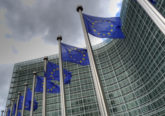In his stimulating recent post ‘France and the New Balance of power’, Oxford’s Geoffrey Gertz argues that the near-certain election of Francois Hollande will change the balance between ‘North’ and ‘South’ in Europe. Having for so long reckoned herself part of the German, Dutch, Scandinavian and Eastern European ‘North’, he suggests, France will now join Greece, Portugal, Spain, Italy and possibly Bulgaria and Hungary in the ‘South’. He may well be right: Hollande’s recent demands that the stability pact be renegotiated, that Germany would have to push for growth as well as balanced budgets and the whole tenor of his campaign is evidence enough. I wonder, though, whether a Hollande victory might not also have profound consequences for relations between east and west in the Union. It is no secret that German chancellor Merkel is praying for a Sarkozy victory, and even if she makes an effort to get on with Hollande, the judgment of the markets on any new French fiscal policy may leave Paris and Berlin facing a massive banking collapse within weeks (and I am surprised that this is not already looming). If this happens, Hollande, for all his ‘southern’ sympathies will be dependent on the north and east to bail him out.
The election of Hollande will have another major ‘east-west’ effect. Contemporary Germany is surrounded by friendly states and shows little signs of engaging with the threat of Russian power; it is also – as the British defence secretary Philip Hammond pointed out only yesterday – failing to pull its military weight within Europe, let alone overseas. Hitherto, this has been somewhat compensated by President Sarkozy’s grater activism, for example over Georgia and Libya, but it is hard to imagine Hollande in the same role. The result of this will certainly be an even greater sense of nervousness on the European and Nato periphery – especially Poland and the Baltic states – especially since President Obama has indicated his intention to concentrate on East Asia over Europe. In short, whether east, west, north or south, Europeans are now finding themselves confronting each other rather than their common challenges, a situation which the European Union was supposed to bring to an end, and which the French election result will almost certainly aggravate.
Brendan Simms is Professor in the History of International Relations. POLIS, Cambridge






No Comment